
Just like you go to Google to find a new restaurant, plumber, or pet sitter, your potential clients turn to search engines to find legal services—and the statistics back it up:
💻 96% of people who look for legal advice use a search engine.
💻 89% of law firms say digital marketing is essential for their overall marketing.
💻 Over 39% of clients find their lawyer through an online search.
If you’re reading this, you probably already know that SEO is critical to rank high on Google and drive hundreds (or even thousands) of potential clients to your law firm’s website.
One of the most important aspects of SEO is link building, and many consider it Google’s number one factor when determining a website’s ranking in search results.
In this article, we introduce the fundamentals of a good link-building strategy for your law firm. We explain what link building is, why it’s essential for SEO, and outline simple ways to acquire backlinks.
Then, we go more in-depth and focus on how law firms can leverage their specialized knowledge to generate high-quality links.
Let’s get started.
Contents:
How Link Building Gives Law Firms a Competitive Advantage
Now that you know which websites link to your competitors, you can do the following:
Link Building for Lawyers: 8 Proven Strategies to Build Links
Unlock the Power of Link-Building with Authority Builder
Link Building for Law Firms: The Basics
First, let’s cover the basics of link building by answering some key questions:
🌐 What is a backlink?
Backlinks (also known as inbound links) are hyperlinks on one website that point to another website.
For example, if a legal blog links to your law firm’s website, that link is considered a backlink to your site.
The legal blog that linked to you is called the “referring domain.”
🌐 Why do backlinks help websites rank higher in search?
To understand why backlinks are so important, we first need to understand how search engines like Google evaluate and rank websites.
When you search for something on Google, you want the most accurate and helpful results—and Google wants to provide exactly that.
But how does Google know which results are most helpful?
It uses a complex algorithm that considers a number of factors to determine the relevance and quality of web pages. One of these factors is how many backlinks are pointing to your website.
If reputable sites link to your content, it suggests to search engines that your content is valuable, reliable, and worth sharing. This, in turn, boosts your site’s chances of ranking higher in search results.
Essentially, backlinks are like votes of confidence from other websites. The more high-quality backlinks your site has, the more likely it is to rank higher in search results.
🌐 What makes a good backlink?
If having a higher number of backlinks to your website helps your site rise in search engine rankings, then surely the more, the better—right?
Not exactly.
Not all links are created equal. While the quantity of backlinks is important, the quality of those backlinks is even more important.
Here’s what makes a good backlink:
⬆️The authority of the linking website
Getting a backlink from an authoritative website carries more weight than a link from an unknown site.
An authoritative website is one that is well-established, reputable, and frequently cited by other high-quality sites. They are trusted and respected by users and all search engines.
For example, say your law firm secures high-quality links from major news outlets like Forbes or leading legal publications such as the American Bar Association Journal.
This will boost your law firm’s credibility much more than getting a backlink from a blog post on a small legal website—and it does the same for your website in the eyes of search engines.
⬆️ Relevance
The linking site’s relevance to your industry matters.
If you run a law firm, a backlink from other relevant websites (such as a law blog or legal directory) is like getting a recommendation from a peer within your field.
These links help establish your site as a trusted source within your niche.
For example, if a reputable legal blog links to your article about recent changes in divorce law, it tells Google that your content is valuable to people interested in legal matters.
A backlink from an unrelated industry, like a gardening site, won’t have the same positive impact because it doesn’t reinforce your authority within the legal field.
⬆️ The quality of the linking website
High-quality websites are those with a good track record of publishing reliable and engaging content. When they link to your site, it’s a strong endorsement.
But how can you tell if a website is high quality?
It’s not always obvious just by looking at the site. This is where domain rating (DR) and domain authority (DA) come in.
These metrics, rated on a scale of 0-100, are developed by SEO tools Ahrefs (DR) and Moz (DA). They give you an indication of a site’s overall strength and authority based on its backlink profile and other factors.
A higher DR or DA score typically means the site is more reputable and influential. Getting a backlink from a high DR or DA site can provide a massive boost for your own SEO.
⬆️ Active with organic traffic
Links from websites that receive consistent, organic traffic are more valuable than sites that receive low traffic.
If your link is placed on such a high-quality site, the likelihood of it being clicked on increases and it could also drive more visitors to your site.
Say your law firm’s website link appears on a popular legal advice blog that gets thousands of daily visitors. Some of those visitors are likely to click through to your site and potentially convert into clients.
Organic traffic is a positive signal to search engines and suggests that your site is relevant and engaging.
⬆️ Contextually relevant anchor text
Anchor text is the clickable text in a hyperlink. Here’s what it looks like:

For the best SEO impact, the anchor text should be contextually relevant to the content of the linked page.
For comparison, here’s an example of noncontextual anchor text:

Contextual anchor text like “AI risk management framework” is much more beneficial than “here” because it provides clear context about what users and search engines can expect when they follow the link.
⬆️ Dofollow links
Backlinks can be either “dofollow” or “nofollow.” Here’s what each of those terms mean:
Dofollow links allow search engines to follow the link and pass on SEO benefits to the linked site. These links contribute to the linked site’s authority and ranking potential, much like a strong recommendation would.
Nofollow links do not pass on SEO value, although they still drive traffic.
So, a dofollow link from a respected legal directory will drive traffic and boost your site’s SEO while a nofollow link from a high-traffic site might bring visitors, but without the SEO benefit.
How Link Building Gives Law Firms a Competitive Advantage
To showcase the real-world impact of link building for law firms, let’s dive into a comparison of two law firms using Ahrefs.
Let’s compare two major international law firms: Skadden, Arps, Slate, Meagher & Flom LLP (Skadden) and Latham & Watkins LLP (L&W).
Both firms are industry giants with annual revenues running into billions of dollars.
However, a closer look at their backlink profiles reveals some interesting insights about the power of link building.
Here’s a look at Skadden’s backlink profile. It reveals that they have 115,026 backlinks:
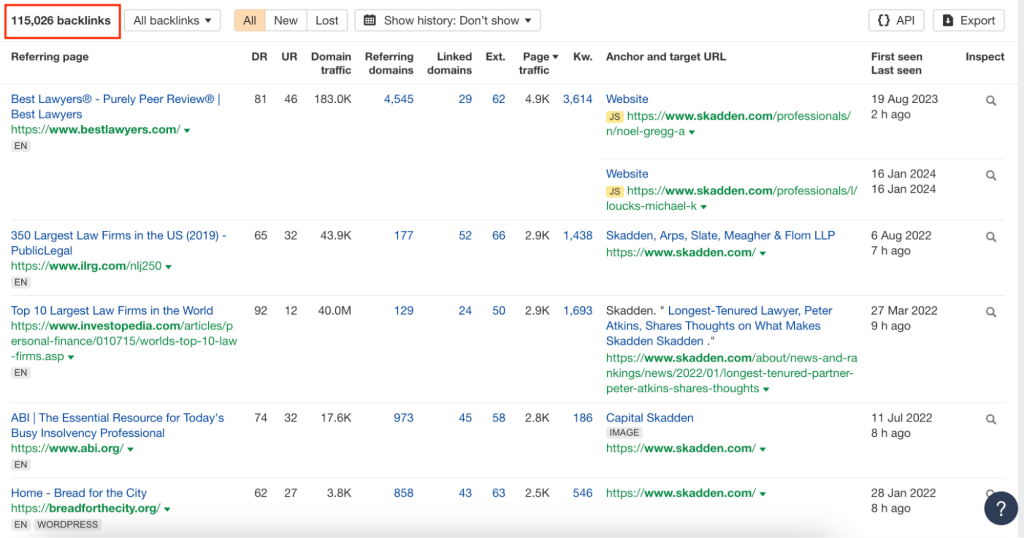
And here’s a look at L&W’s backlink profile. It shows that they have almost double the number of backlinks with 236,813 links:
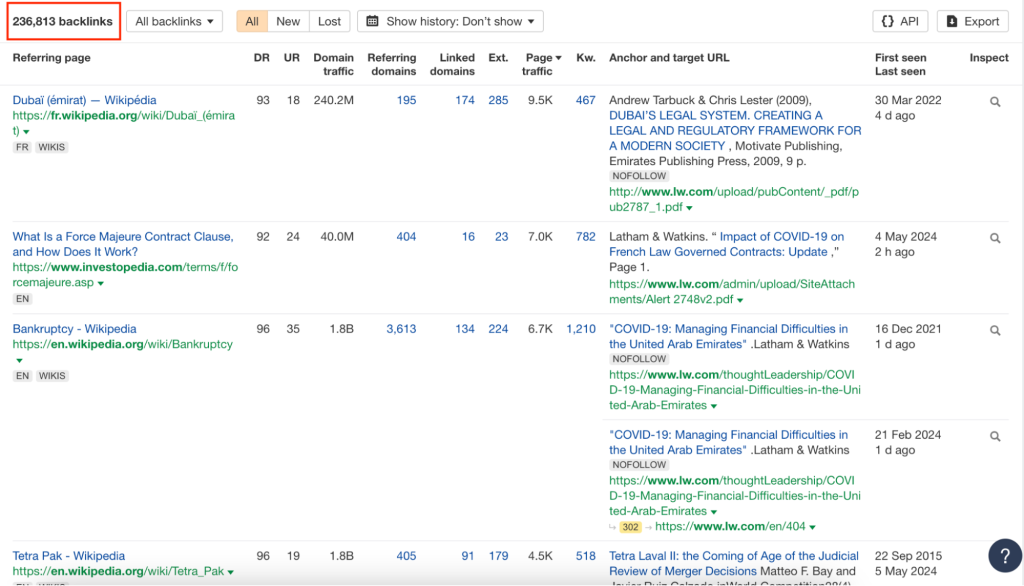
But when it comes to tangible results, what does this actually mean?
Let’s take a look at each law firm’s organic traffic:
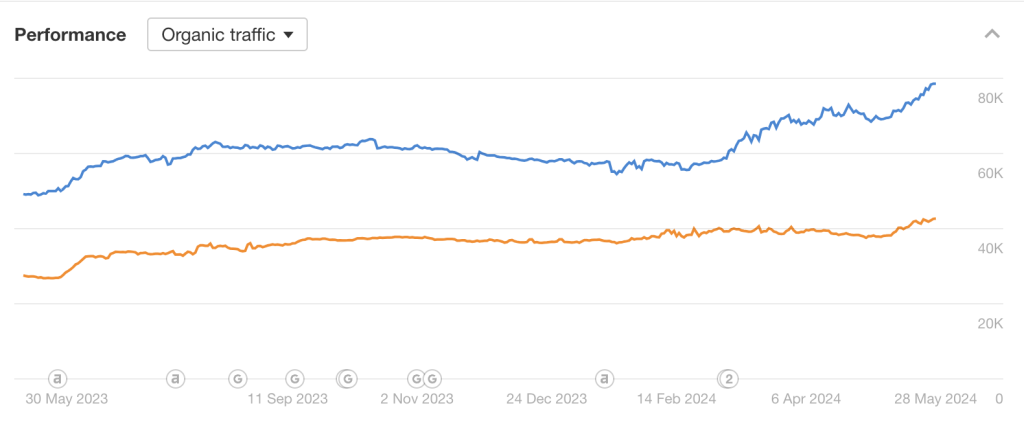
L&W (represented by the blue line) gets almost 80,000 visits every month while Skadden receives just over 40,000 visits. Here’s how their link-building strategy helped them achieve this:
✅ Higher rankings: With more high-quality backlinks, L&W ranks in the top positions for more keywords. This means more visibility in search engine results, which makes it easier for potential clients to find them.
✅ Authority: Backlinks from authoritative and relevant sites enhance L&W’s credibility in the eyes of search engines, further solidifying their top rankings and leading to sustained organic growth.
✅ Improved reach: L&W’s extensive backlink profile means their content reaches a wider audience. When sites link to their content, it not only boosts SEO, but also drives traffic from those sites, expanding their reach even further.
💡 How Skadden can find more link-building opportunities
If you were managing SEO for Skadden, you’d probably want to develop a link-building strategy to ensure they remain competitive with L&W.
One of the easiest ways to begin developing your link-building strategy is by using Ahrefs to examine your competitors’ backlink profiles.
Once you’ve determined which sites are linking to your competitors, you can find out whether those sites would be willing to link to yours, too.
Here’s how to do it:
1. Visit Ahrefs’ Site Explorer and type in your URL
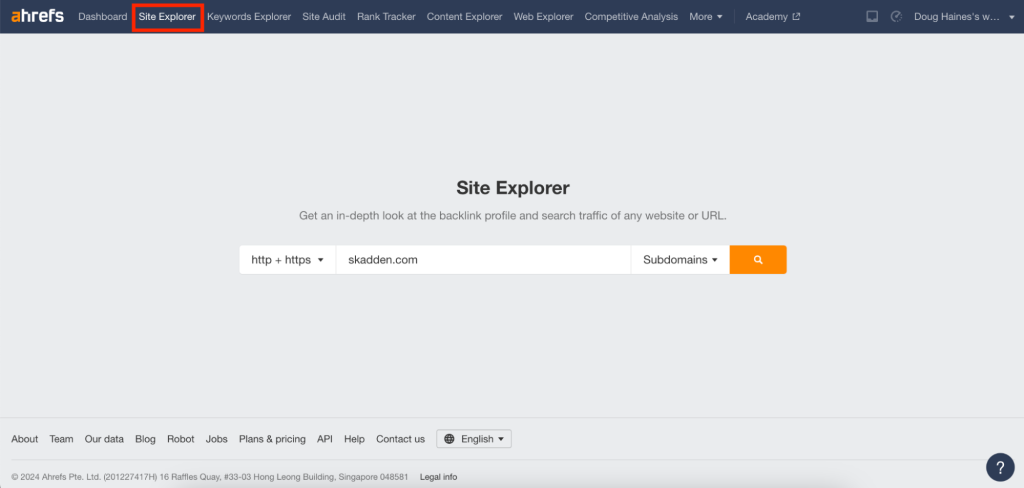
2. View your top competing domains
From the ‘Overview’ page, scroll down to the section on top organic competitors and click ‘View top 20’:
Here, you will be able to see a list of your top competitors and how many backlinks they have:
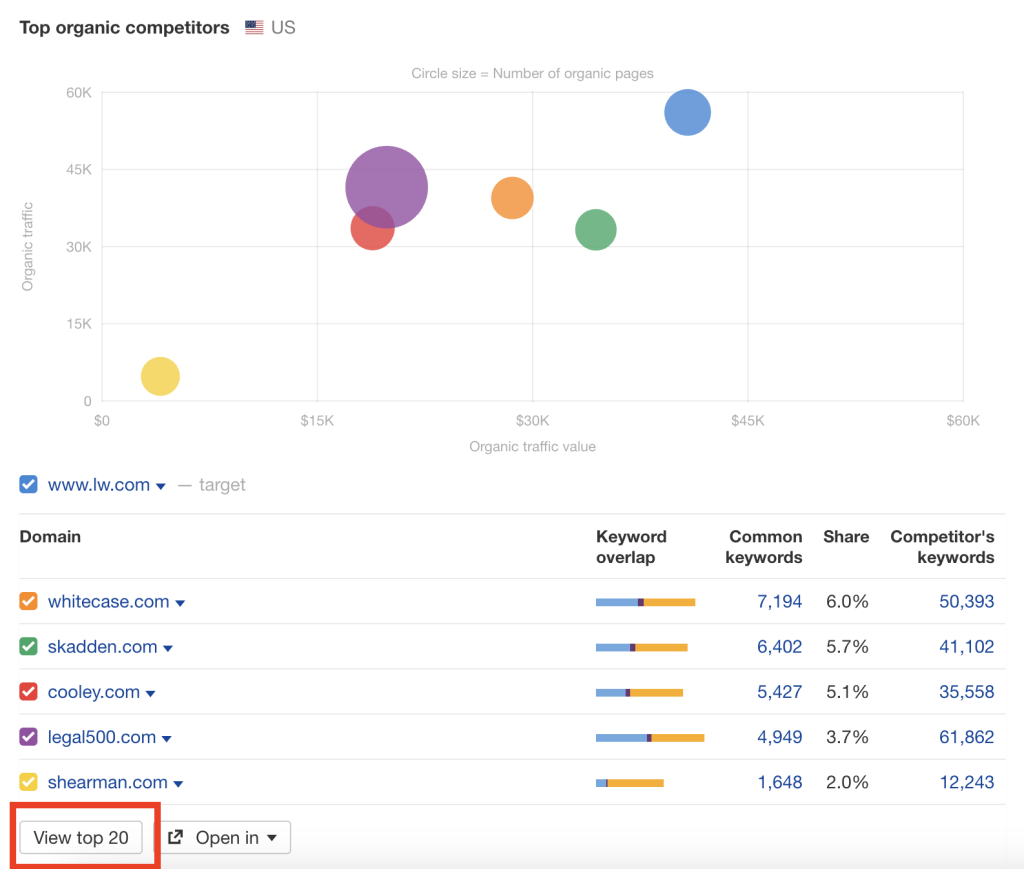
In the example above, the top website in this category is SEC.gov. As a .gov website, this is a highly authoritative site owned by the U.S. government.
Law firm websites are unlikely to be able to compete with it—so let’s ignore it and look at our other competitors.
3. Perform a link intersect
Now that we know who our top competitors are, we can go back to the Ahrefs overview page and perform a link intersect:
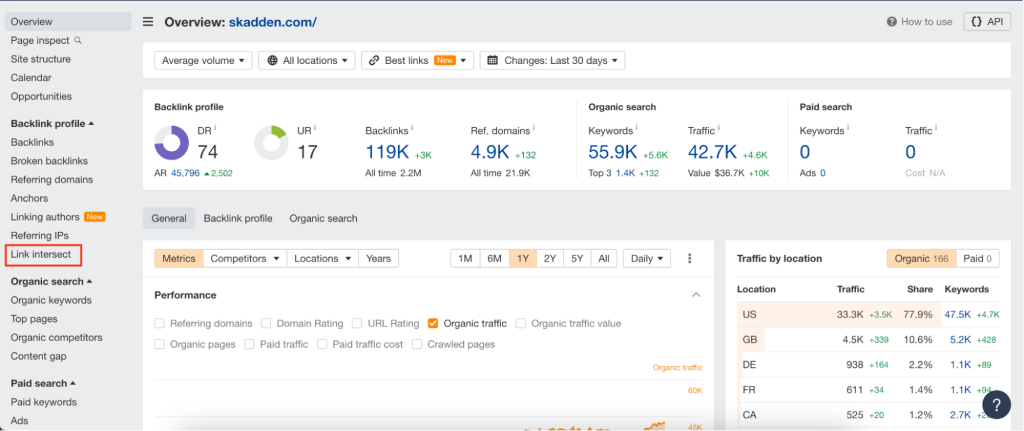
Here, you can type in your competitors’ URLs to see which websites link to them, but not to your site:
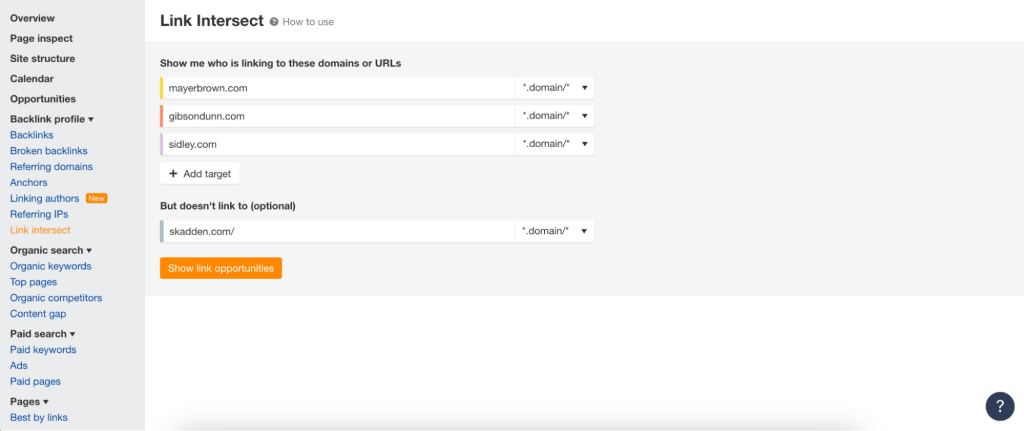
Ahrefs will generate a list of all of the websites that are linking to your competitors:
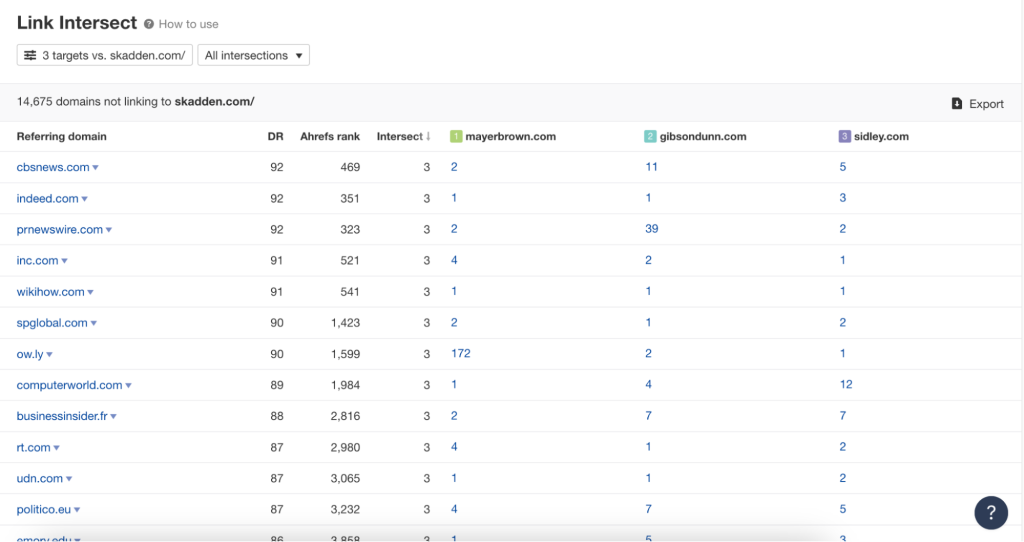
Now that you know which websites link to your competitors, you can start building links. We explain some of the ways you can do this in the next section.
| ℹ️ Leverage Your Expertise to Build Links
Law firms are in a unique position when it comes to link building. The legal world is complex and difficult to navigate, yet almost everyone needs legal advice at some point. You mainly apply your expertise as a lawyer to guide your clients—but don’t forget that it can also be a valuable asset for building backlinks. Whether it’s understanding new regulations or navigating personal legal issues, there’s always demand for expert legal insights. This reality places law firms in the perfect position to become go-to resources for journalists, bloggers, and other content creators who need authoritative information. By leveraging your legal expertise, you can build a robust backlink profile that enhances your search engine rankings and online visibility. |
Link Building for Lawyers: 8 Proven Strategies to Build Links
These strategies are organized from basic to more advanced techniques.
You can start with the easier ones and work your way up as you begin to see results and become more comfortable with the link-building process:
🟢 Easy
1. Post regularly on social media
Posting on social media is straightforward and probably already part of your digital marketing strategy.
While social media links aren’t the most powerful for SEO, they play an important role in keeping your audience engaged and driving organic traffic to your website.
Regular updates on platforms like LinkedIn, Twitter, and Facebook also show that your law firm is active online, which is a positive trust signal to search engines.
ℹ️ Why it works: Social media engagement indicates to Google that your website is active and relevant, which helps to build trust and credibility.
2. Register on local and professional legal directories
Listing your firm on professional directories and Google Local Services is essential for both visibility and credibility.
While these links may not be the most powerful, they are important trust signals to Google and confirm that your business is legitimate and operational.
Some reputable legal directories you can list your law firm on, include:
ℹ️ Why it works: Directory listings validate your business’s legitimacy to both search engines and potential clients.
3. Answer questions on forums
Participating in forums like Reddit and Quora can be a surprisingly effective way to build backlinks.
Historically, these links weren’t considered valuable, but recent Google algorithm updates have changed this. By answering questions and providing valuable insights, you can build your reputation and earn backlinks where appropriate.
Here’s an example of an answer to a Quora question on how to go about getting a divorce in California:
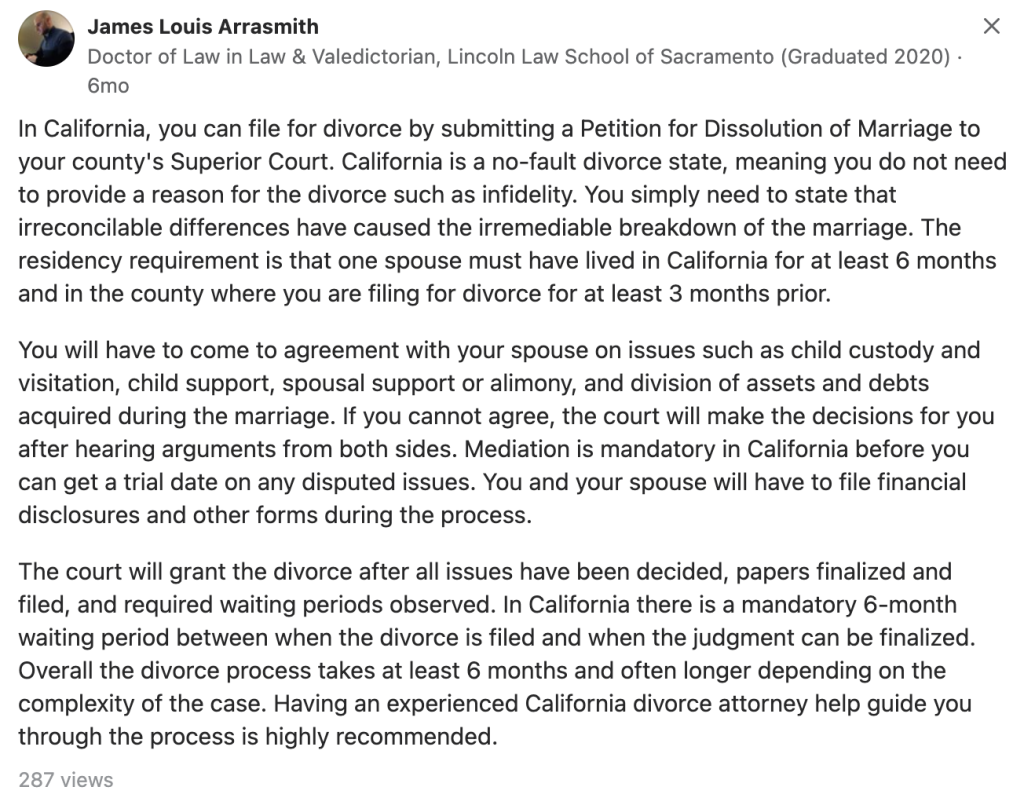
ℹ️ Why it works: Engaging in forums shows users that you’re active in the community and builds your credibility with Google.
| 💡 Remember to Add Value
When answering questions on forums, your primary goal should be to add value for the user. Focus on providing helpful answers that genuinely address the questions posed. Backlinks should be secondary and only included when they are directly relevant and add further value to the discussion. Avoid excessive self-promotion. Instead, build your reputation by being a trusted and valuable resource in your field. In some forums, you may even get banned if you post a link to your website. Reddit for example, has a karma system. The more people like your posts, the more karma you gain. You need to build up your karma score and credibility with the community before you can begin posting links to your own website. |
🟠 Intermediate
4. Answer journalists’ questions
Services like Connectively (formerly HARO), ResponseSource, and Qwoted, let you offer legal expertise to journalists looking for sources.
This is a particularly well-suited option for lawyers because journalists often need authoritative insights on legal matters. If a journalist relies on your expertise in their article, they’re likely to link to your website.
Here’s an example of a query posed by a journalist, aimed at lawyers and experts involved in civil rights:

ℹ️ Why it works: Reputable news outlets are highly trusted by users and Google alike. Obtaining a backlink from a respected site, such as Forbes, can have a significant positive impact on your SEO.
-
Produce high-quality content
Creating high-quality content is essential for attracting backlinks.
Investing time in quality content is worthwhile because it can generate backlinks over the long term. This is because valuable content has great potential to be shared by publications, other websites, and users.
To create content that attracts backlinks, you’ll need to:
- Conduct keyword research to identify what your target audience is searching for.
- Analyze competitors to see what content is performing well in your niche.
- Ensure your content is comprehensive and provides real value.
- Promote it on social media and submit it to relevant blogs.
The blog post When to Hire a Lawyer from LegalZoom is a fantastic piece of content that has attracted 538 backlinks:

Here’s why it stands out:
✔️ Addresses a common query
The article tackles a specific and common question that many people have: when do you need to hire a lawyer?
By directly addressing this query, it targets relevant keywords and meets the immediate needs of its audience.
✔️ Comprehensive
The content doesn’t just give a simple answer—instead, it breaks down the answer into various scenarios:
- Common situations such as criminal charges.
- Potential loss of significant amounts of money.
- Complicated divorces.
This approach ensures that readers gain a full understanding of the topic, which increases the time spent on the page and the likelihood of receiving backlinks.
✔️ Structured layout
The article is well-structured with clear subheadings, making it easy for readers to skim and find the information they need quickly.
A structured layout with subheadings enhances readability, the user experience, and helps Google understand the page.
ℹ️ Why it works: Audiences frequently seek straightforward answers to complex questions. Helping them make informed decisions generates traffic and helps you acquire backlinks.
🔵 Advanced
6. Create linkable assets
Linkable assets are similar to content but cover a broader range of channels. They are designed specifically to attract backlinks from other websites. They can include:
- Tools and calculators: Interactive tools that solve specific problems or provide valuable information.
- Infographics: Visually appealing graphics that present information in an easily digestible format.
- Videos: Engaging and informative videos that explain concepts, demonstrate how-tos, or provide entertainment.
- Tutorials: Comprehensive, step-by-step guides that provide in-depth information on a specific topic.
- Reports: Original research or data analysis that offers new insights into a particular field.
- Whitepapers: Detailed documents that provide extensive knowledge on a topic, often available for download.
Creating linkable assets can be expensive and time-consuming. For example, if you were a conveyancing attorney and wanted to create a mortgage app, you would need people to:
- Manage the app’s development.
- Write the app content.
- Design the graphics.
- Keep the app updated.
ℹ️ Why it works: High-quality linkable assets are often referenced by other websites, bloggers, and media outlets, resulting in natural links.
7. Write guest posts
Guest posting on trade press sites and professional membership organizations is an effective strategy for building backlinks and establishing authority in your field.
These platforms are trusted and authoritative, which means that backlinks from them carry significant weight.
Here’s an example, entitled Ten Ways Your Limitation of Liability Provision Is Actually Ineffectual. This post was published on the ACC website, a highly respected platform for in-house counsel:

Here’s how to get guest posting right:
Research guest posting sites: Look for trade press sites and professional membership organizations relevant to your industry that accept guest posts. Make sure they have a good reputation and high domain authority.
Create your content: Choose a current topic that will provide value to readers. Consider what issues or questions are most pressing for your target audience.
Craft a compelling pitch: Write a concise and compelling pitch that outlines your guest post’s topic, why it’s relevant, and what value it will bring to their publication’s audience.
Follow guidelines: Make sure to follow the publication’s submission guidelines if they have specified any.
ℹ️ Why it works: Guest posting helps you establish relationships with website owners in your niche, exposes you to a broader audience, and helps you build links from authoritative sites.
| 💡Use a Professional Content Writer
Quality matters! If writing isn’t your strong suit, consider hiring a professional content writer who can craft well-researched, engaging, and polished articles. |
8. Use the Skyscraper Technique
The Skyscraper Technique is one of the top link-building strategies for law firms because legal content needs to be comprehensive and up-to-date.
It involves finding popular content with lots of backlinks, improving upon it, and promoting your superior version.
For example, this article entitled Retiring in Canada vs. the U.S.: Which Is Better? on the blog Aging Greatly contains a backlink that readers can follow to learn more about the EB-5 Program for getting a green card:

When a reader follows this link, they are directed to the website Immigration to America:
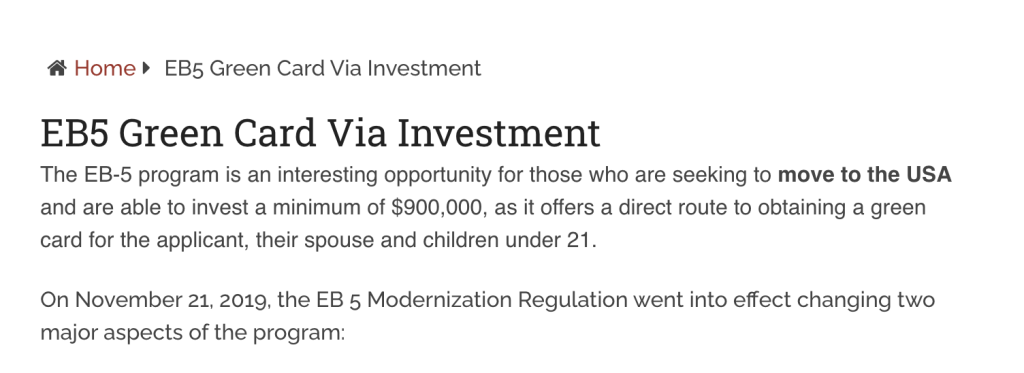
The article will benefit from an update, as it states that the minimum investment amount for the EB-5 Program is $900,000.
However, in March 2022, the minimum investment amounts for the respective EB-5 options changed.
The minimum investment in a Targeted Employment Area (TEA) is now $800,000, and the minimum investment outside of a TEA is $1,050,000.
If you were an immigration lawyer, you could write your own article about the EB-5 Program, ensuring it’s more comprehensive and up to date.
After creating the content, you could reach out to Aging Greatly and ask them to replace the backlink with a link pointing to your site.
ℹ️ Why it works: Lawyers deal with ever-changing legal landscapes, and outdated information isn’t helpful to readers. There are countless pieces of outdated content online that you can update and improve as part of your link-building strategy.
Unlock the Power of Link Building with Authority Builders
Link building remains one of the top-ranking factors in Google’s algorithm, making it a non-negotiable strategy for law firms.
By understanding the basics and leveraging your firm’s specialized knowledge, you can build a robust backlink profile, improve your search engine rankings, and ultimately attract more clients.
Ready to boost your law firm’s presence? For personalized advice and tailored link building for lawyers, contact us and let our experts help you make a positive impact online.
